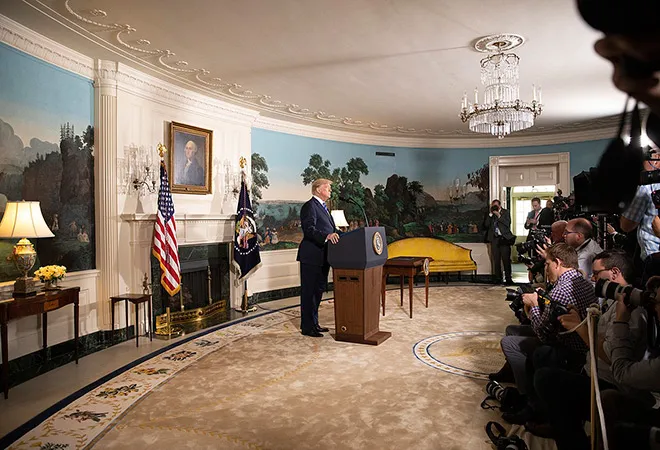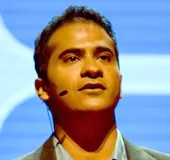-
CENTRES
Progammes & Centres
Location

Long before George W. Bush dubbed Iran as one of the antagonists in the ‘axis of evil’, ties between Washington and Tehran were frosty to say the least. There have been no diplomatic relations between the two since 1980s. Tehran’s nuclear program has been seen as a threat to the region and Washington considers Tehran — a chief exporter and state sponsor of terror.
The United States along with the other E3+3 members of the UN had imposed a series of complex and hard-hitting sanctions on the Islamic Republic of Iran as a punishment for its nuclear development. Furthermore, the United States’ close partnership with Saudi Arabia and Israel, only exacerbates the acerbic relationship between Iran and the world’s most powerful nation.
However, there was a chance to bring this acrimony to an end with the landmark Joint Comprehensive Plan of Action (JCPOA). The Obama administration and its allies in Europe felt that the JCPOA would help with bringing Iran to the negotiating table. The US and the west would lift the sanctions in exchange for Iran promising to curtail its nuclear development.
Among the most important, the deal called for reducing Iran’s stockpile of enriched uranium by 97 percent and banning them from possessing any uranium potent enough — that it could be used to fuel a bomb. A unilateral American withdrawal from the deal has meant more sanctions on Iran’s oil sector, which had been previously lifted as part of the agreement. Under the Trump’s administration’s bellicosity, only two option remains on the table.
Secretary Pompeo and NSA Bolton coalesce with President Trump when he called the Iran Deal, the worst deal he had seen. Trump, a successful real estate mogul, before his presidency, bragged about his deal execution strategy and chronicled them in his book The Art of the Deal.
By doing this, the United States will continue to appease its allies in Saudi Arabia and Israel, two virulent opponents of the JCPOA or anything that relives pressure on Tehran. Washington is uncertain of Tehran’s motives with the JCPOA. It’s possible they could stay in the deal. Or Iran could violate the deal’s restrictions and dash for a nuclear weapon. Additionally, Iran’s financial support for violent militias around the Middle East (like Hezbollah in Lebanon) will be curtailed with such sanctions.
However, the conundrum of following this course of action means that sanctions will precipitate a major crisis with America’s European allies, as some European companies do have business dealings with Iran. By reimposing these sanctions, Trump has put the US in clear violation of their obligations under the deal.
Note that the deal is far from dead, Iran could go ahead with the other E3+3 members and still negotiate. Conversely, Iran could have less incentive to stay on (with the American withdrawal) and this could push them closer to Russia and China.
The White House’s other alternative would be to consider negotiations with Iran again.
The International Atomic Energy Agency (IAEA) suggests that Iran was actually complying with the deal. Tehran has dismantled a huge portion of its nuclear program and international inspectors have been given permission for inspections. Trump is myopic in not realizing that the deal puts Iran further away from a nuclear weapon than the current sanctions, as Iran can’t enrich uranium covertly with this deal.
The obvious caveat on going back to the JCPOA will make the Trump administration look politically weak and its dithering Middle East foreign policy will look schizophrenic.
Going ahead with the JCPOA could preclude the chance for the Iran hawks in the administration to renegotiate a stronger deal with little wiggle room.
At a time of Iran hawks in Bolton and Pompeo, it is former Secretary of Defense, James Mattis’ who has been a firm believer in the JCPOA. He firmly felt that it would be better to reconsider the JCPOA for a better diplomatic outlook for the Middle East. The United States needs a solution to the Iran crisis, and withdrawing from the JCPOA only leaves hostilities with Iran simmering. The Trump administration could easily be blamed for a new crisis brewing in the Middle East.
Trump needs to realize that secondary sanctions don’t punish Iran directly. It hurts some financial institutions that lend to businesses with Iran’s oil sector. Instead of hitting Iran, it cuts off access to US markets for third parties and strategic allies like India, that import oil from Iran.
The deal is a perfect quid pro quo: Iran agrees to nuclear restrictions in exchange for the financial benefits of sanctions relief, which would amount to billions and billions of dollars. If the rest of the countries don’t reimpose their own sanctions, Iran may very well end up still having more access to international markets than it had before the deal was inked.
The views expressed above belong to the author(s). ORF research and analyses now available on Telegram! Click here to access our curated content — blogs, longforms and interviews.

Akshobh Giridharadas was a Visiting Fellow based out of Washington DC. A journalist by profession Akshobh Giridharadas was based out of Singapore as a reporter ...
Read More +